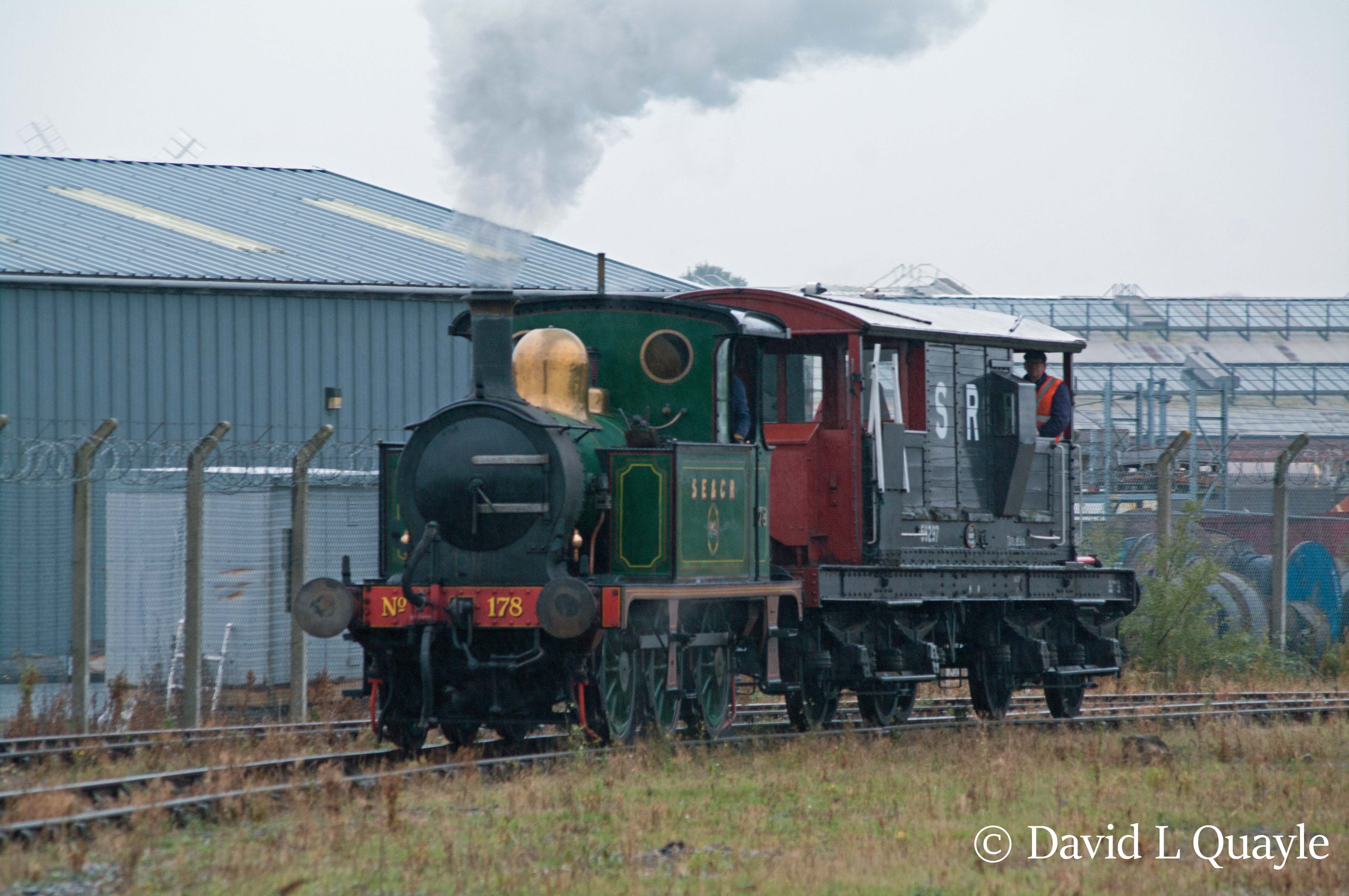
178 was built at Ashford works in 1910 and was allocated to Ash, a sub-shed of Reading. In those days, Reading had both GWR and SECR stations and sheds. Its main duties were working the push-pull service between Ash and Aldershot. The success of these services required heavier trains and the P class tanks were replaced by more powerful locomotives so 178 was transferred to the South London area to work the Beckenham Junction to Norwood Junction service. In the period immediately before the outbreak of World War I, it was based at Longhedge (Battersea) and regularly worked on Victoria/St.Pauls shuttles and to Greenwich Park from Nunhead and Victoria.
Soon after the outbreak of war, 178 was allocated to Margate where it worked local passenger trains before being sent to Hastings for a year. In 1916, 178 was stood down from local services and was sent to Redhill for carriage shunting duties for a few months and then on to Kidbrooke in South London where it worked in the aeronautical stores situated next to the Charing Cross to Bexleyheath Line. 1917 saw it allocated to Bricklayers Arms shed in South London for the following two years and then in 1919 it had a spell at Orpington working the Swanley to Otford shuttles. A further transfer to Tonbridge followed and 178 spent several years operating over the Westerham branch, a duty that it shared with sister engine 323, which is also preserved on the Bluebell Railway.
At the grouping of the railways in 1923, it was taken into the ownership of the Southern Railway and eventually renumbered 1178. In 1926 all the P Class locomotives were withdrawn from passenger duties and No 1178 was transferred to Folkestone and then to Dover and operated in that area for many years mainly on light shunting duties around the docks. 1943 saw another transfer, this time to Brighton on former London Brighton & South Coast Railway (LBSCR) territory.
The nationalisation of the railways in 1948 saw further renumbering, initially to s1178 in March 1948, and finally to 31178 in 1951. During 1953, 31178 participated in trials with a B4 class 0-4-0T along the sea front at Dover, hauling goods to the Eastern Docks. This traffic had increased over the years and was proving difficult for the P class allocated to the task. One of the regular duties was to take wagon loads of scrapped locomotive parts from Ashford to a scrap metal merchant adjacent to the docks. The B4 managed 28 wagons to the P’s 20, so 31178 was reduced to a standby status for this activity. It continued to shunt the town yard, the ferry dock and the harbour board lines for several years, with a spell on loan to the Ridham Dock exchange siding of Bowaters Paper Mills in 1953, and Chislet Colliery in the Kent coalfields in 1955.
A transfer back to Bricklayers Arms also in 1955 ended when it was replaced by a diesel shunter and 31178 returned on loan to Bowaters in 1956. Following mechanical problems it was sent to Ashford for repairs. Its final allocation was to Stewarts Lane, Battersea, where it was used to shunt the milk depot, a duty which it retained until replaced by a diesel in 1958.
31178 was withdrawn in June 1958 as surplus to requirements and sold to Bowaters, returning to familiar territory at Ridham Dock.
31178 was purchased from Bowaters by the Bluebell Railway in 1969, by this time non-operational due to the cylinder block having cracked earlier that year. By this time diesels had taken over the duties on the standard gauge section of the Bowaters railway system. It was purchased by members of the Port Line locomotive group, who started restoring it in 1992. Work continued on this engine including fitting it with a new boiler, originally fitted to 323 when it arrived in 1960.
31178 was transferred the Bluebell Railways ownership in November 2007 and work continued with the firebox requiring partial renewal of the foundation ring. It returned to steam in February 2010 as Bowaters’ Pioneer II in SE&CR green. The locomotive was finished as SE&CR 178 in May 2010 and was formally re-entered into service on 1 May 2010. It is currently painted in SE&CR lined green.
The locomotive is available for limited services on the Bluebell Railway as it has a cracked cylinder.
The boiler certificate is due to expire in February 2020 but consideration is being given to extending the life by six months as the locomotive has seen little use over the years of its boiler certificate.
In January 2020 it was revealed that the boiler certificate had been extended to August 2020. In the event the locomotive was taken out of service in October 2020 10½ years after entering traffic.
| Home Base | Current Status | Owner |
| Bluebell Railway | Out of service | Bluebell Railway |














- 31027 (ROD 5027, SR A27, SR 1027 & BR 31027)
- 31323 (SECR 323, SR A323, SR 1323 & BR 31323)
- 31556 (SECR 753, ROD 5753, SR A556, SR 556 & BR 31556)